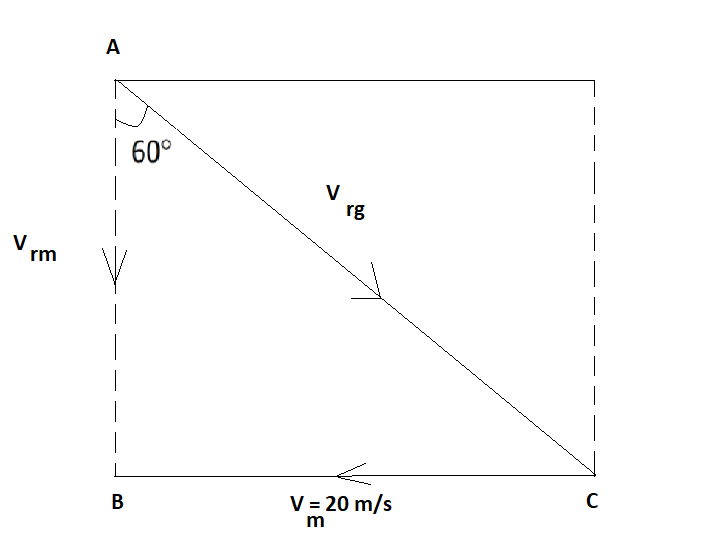Question
Question: A person standing on a road has to hold his umbrella at \[60^\circ \] with the vertical to keep the ...
A person standing on a road has to hold his umbrella at 60∘ with the vertical to keep the rain away. He throws the umbrella and starts running at 20ms−1. He finds that raindrops are hitting his head vertically. Find the speed of the rain drops with respect to (a) the road and (b) the moving person.
Solution
We will draw the direction of rain with respect to man as vertical in nature and direction of rain with respect to the ground as slanting in nature. Then we will apply trigonometric ratios respectively and manipulate accordingly.
Complete step by step answer:
In the given question, the person is standing on the ground and he holds his umbrella at an angle of 60∘ with the vertical, so that rain can’t fall on him.
So, from the figure it is quite evident that direction of direction is slanting in nature and more like a diagonal. The arrow mark indicates the direction of the falling rain drops.
After throwing away the umbrella, when he starts running at a speed of 20ms−1 towards the left, the raindrops are falling vertically on his head. The arrow mark indicates the direction of falling rain drops.

In the figure,
ΔABC has sides marked with various speeds:
vrg indicates the speed of the rain with respect to the ground.
vrm indicates the speed of the rain with respect to the man.
vm indicates the speed of man running at.
So, we now calculate the speed of rain with respect to:
First case (a) the road:
In the ΔABC, to calculate the speed of the rain with respect to the ground, we take the trigonometric ratio of sine of an angle which relates perpendicular and hypotenuse.
\sin 60^\circ =\dfrac{{{v_{\text{m}}}}}{{{v_{{\text{rg}}}}}} \\\
{v_{{\text{rg}}}} = \dfrac{{{v_{\text{m}}}}}{{\sin 60^\circ }} \\\
{v_{{\text{rg}}}} = \dfrac{{20}}{{\dfrac{{\sqrt 3 }}{2}}}\,{\text{m}}{{\text{s}}^{ - 1}} \\\
{v_{{\text{rg}}}} = \dfrac{{40}}{{\sqrt 3 }}\,{\text{m}}{{\text{s}}^{ - 1}} \\\
Hence, the speed of the rain with respect to the rain is 340ms−1.
First case (b) the moving person:
In the ΔABC, to calculate the speed of the rain with respect to the moving person, we take the trigonometric ratio of tangent of an angle which relates perpendicular and base.
\tan 60^\circ =\dfrac{{{v_{\text{m}}}}}{{{v_{{\text{rm}}}}}} \\\
{v_{{\text{rm}}}} = \dfrac{{{v_{\text{m}}}}}{{\tan 60^\circ }} \\\
{v_{{\text{rm}}}} = \dfrac{{20}}{{\sqrt 3 }}\,{\text{m}}{{\text{s}}^{ - 1}} \\\
Hence, the speed of the rain with respect to the rain is 320ms−1.
Note:
In this problem, you need to keep in mind that the direction of rain with respect to the ground is slanting in nature and direction of rain with respect to man is straight downward. It is important to note that the side opposite to the angle 60∘ is of magnitude 20. If you want a relation between perpendicular and base then use trigonometric ratio tangent, whereas if you want a relation between perpendicular and hypotenuse then use trigonometric ratio sine.
